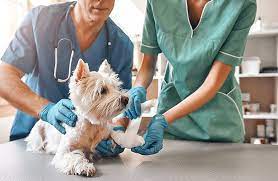If you're searching for "vets with ultrasound near me," you likely need fast, reliable diagnostic services for your pet. Ultrasound is a non-invasive, painless imaging technique that helps veterinarians diagnose a variety of health issues in pets, from internal organ problems to pregnancy monitoring. Finding a veterinarian near you who offers ultrasound services is essential for accurate diagnosis and timely treatment.

In this article, we’ll explore how to locate vets that provide ultrasound services in your area, the benefits of Veterinary ultrasound, common conditions it can diagnose, and what to expect during the procedure.
Why Choose Ultrasound for Your Pet?
Veterinary ultrasound, also known as sonography, uses sound waves to create real-time images of your pet’s internal organs. It’s particularly useful for examining soft tissues, such as the liver, kidneys, heart, and bladder. Unlike X-rays, which are better suited for imaging bones, ultrasounds provide detailed information about soft organs and tissue abnormalities.
Here are common situations where ultrasound is highly effective:
- Pregnancy detection and monitoring
- Heart disease (echocardiography)
- Abdominal pain or swelling
- Tumors, cysts, and abnormal masses
- Bladder stones or urinary blockages
- Liver, spleen, or kidney issues
- Fluid accumulation or internal bleeding
Ultrasound is a safe, non-invasive procedure that can give vets an immediate look into your pet’s health and help guide decisions about further testing or treatment.
How to Find "Vets with Ultrasound Near Me"
If your pet requires an ultrasound, here’s how to locate a veterinarian near you that offers these services:
1. Search Online for Local Veterinary Clinics
Start with a simple online search for “vets with ultrasound near me” or “veterinary ultrasound services near me”. Most veterinary clinics will list their diagnostic services on their website, allowing you to verify if they offer ultrasound. You can also look for other key services such as emergency care, specialty diagnostics, or surgical options.
Be sure to check the clinic’s reviews and ratings. Positive reviews about diagnostic accuracy and overall pet care can give you confidence in the vet’s abilities.
2. Use Veterinary Directories
Online directories such as VetFinder, Google My Business, or Yelp can help you search for veterinary clinics offering ultrasound services. These directories allow you to filter clinics based on their diagnostic capabilities and display reviews from other pet owners.
Using these directories, you can compare multiple clinics, read feedback, and get directions to the clinic closest to you.
3. Ask Your Regular Veterinarian for Referrals
If your usual vet doesn’t offer ultrasound services, ask them for a referral. Most general veterinary practices work closely with specialized clinics or mobile ultrasound providers and can direct you to a trusted colleague who offers this service.
4. Look for Specialty Animal Hospitals
Larger veterinary hospitals or specialty animal care centers often have advanced diagnostic tools, including ultrasound machines. These centers may also have veterinarians specializing in internal medicine, cardiology, or oncology, who use ultrasound frequently for diagnosing more complex conditions.
5. Mobile Veterinary Ultrasound
In certain situations, mobile ultrasound services may be available, where veterinarians come to your home to perform diagnostic imaging. This can be particularly useful for large animals, such as horses or farm animals, or if your pet is too anxious to visit a clinic.
What to Expect During a Veterinary Ultrasound
Once you’ve found a vet offering ultrasound, here’s what you can expect during your pet’s appointment:
1. Preparation
Your vet may ask that your pet fast for several hours before the ultrasound, especially if the abdomen is being scanned. This ensures the best possible image quality. Additionally, the area being scanned will likely need to be shaved to allow proper contact between the ultrasound probe and your pet’s skin.
2. The Ultrasound Procedure
The vet will place your pet on a comfortable exam table, and a special gel will be applied to the area being examined. The ultrasound probe is moved over the area, sending sound waves into the body and creating real-time images on a screen.
Ultrasound exams are painless, and most pets tolerate them well without sedation. However, if your pet is very anxious or in pain, mild sedation may be recommended.
3. Reviewing the Results
Ultrasound images are usually reviewed immediately, allowing the vet to provide quick feedback on your pet’s condition. Depending on the findings, your vet may recommend additional testing, such as blood work, biopsies, or surgery. In some cases, follow-up ultrasounds may be necessary to monitor the progress of a condition or treatment.
Benefits of Veterinary Ultrasound
Ultrasound provides numerous advantages in veterinary care, including:
1. Non-Invasive and Safe
Unlike other imaging techniques like X-rays, ultrasound is non-invasive and doesn’t expose your pet to radiation. It is a safe procedure that can be used repeatedly to monitor chronic conditions or pregnancy without posing risks to your pet.
2. Real-Time Diagnostics
Ultrasound provides real-time images, allowing veterinarians to quickly assess your pet’s condition and make treatment decisions on the spot. This is particularly beneficial in emergency cases, where swift diagnosis can be crucial.
3. Versatile Use
Ultrasound is highly versatile and can be used for diagnosing a wide range of conditions, including:
- Organ dysfunction (liver, kidney, heart)
- Tumors or masses
- Internal bleeding
- Gastrointestinal issues, like obstructions or blockages
- Fluid build-up
- Pregnancy monitoring in dogs, cats, and large animals
4. Minimally Invasive Procedures
Ultrasound is often used to guide procedures such as biopsies or fluid drainage, making these processes safer and more precise.
Cost of Veterinary Ultrasound
The cost of a veterinary ultrasound varies depending on your location, the type of ultrasound (abdominal, cardiac, etc.), and the complexity of the case. On average, you can expect to pay between $250 and $500 for a basic ultrasound. More specialized ultrasounds, like echocardiograms, may cost more. If cost is a concern, check with your vet beforehand for an estimate and inquire if your pet insurance covers diagnostic procedures.
Conclusion: Finding the Best "Vets with Ultrasound Near Me"
Finding vets with ultrasound near me is essential when your pet requires a more detailed internal examination. Whether it’s to diagnose an illness, check for pregnancy, or monitor an ongoing condition, ultrasound technology offers a non-invasive and accurate way to assess your pet’s health.
To locate a qualified vet in your area, begin with an online search, check veterinary directories, and ask for referrals from your regular vet. With these resources, you’ll be able to find a reputable clinic that offers ultrasound services, ensuring your pet receives the best possible care and diagnosis.
tags: Best Local Ultrasound


